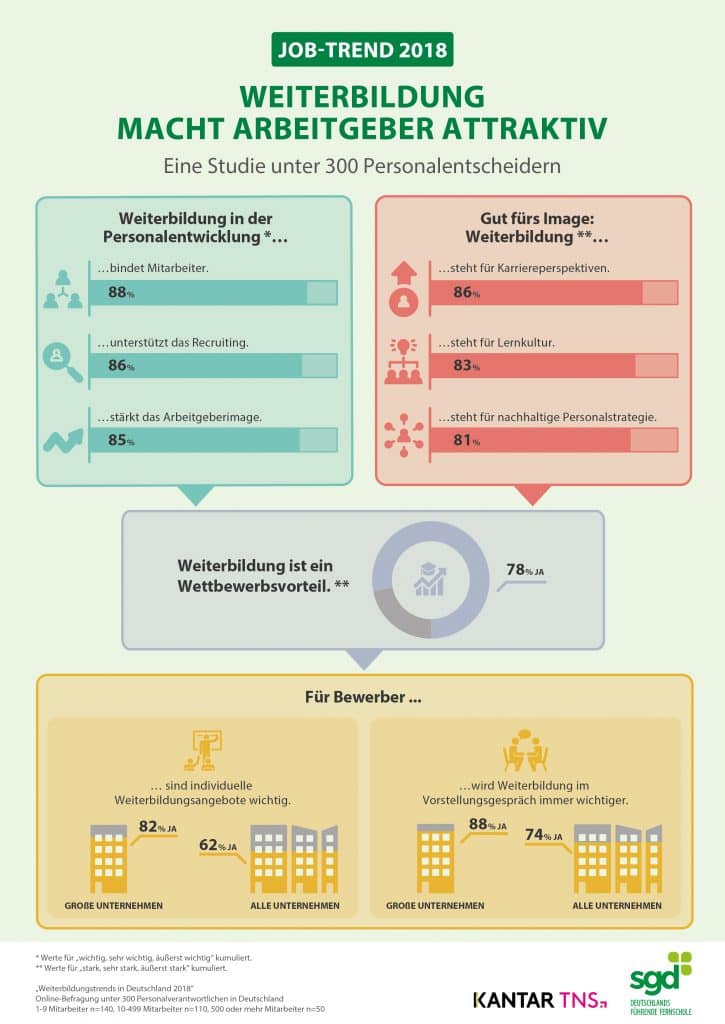Further training secures the future of the company - In the battle for talent, the range of further training is increasingly decisive - study "Further Training Trends in Germany 2018" published
Pfungstadt bei Darmstadt, June 6th, 2018 -
Employers need a convincing image and powerful arguments to attract and retain talent. If you want to make your own company future-proof and position it attractively on the job market, you can address applicants with targeted offers for funding - what is particularly in demand are individual and flexible training opportunities. This is shown by the current results of the study "Continuing Education Trends in Germany 2018". Kantar TNS carried out the annual survey of 300 HR managers on behalf of sgd for the tenth time in a row. 
How important are professional training courses, seminars and training courses for employee retention and the employer brand? The HR managers surveyed gave a clear answer to this question: for 88 percent, further training plays a major role in retaining employees, for 85 percent in strengthening the employer image. "In-house, highly qualified and motivated staff can actively shape the market of the future and is the most important motor for corporate development. Those who neglect the subject of further training will maneuver themselves into the sidelines in the medium term," explains Andreas Vollmer, pedagogical director of sgd. "In order to minimize this risk and to counteract the shortage of skilled workers, employers in practically all industries put employee development at the top of their agenda with tailor-made further training offers."
Further training strengthens the image
But how does the reputation as an employer benefit from this commitment? According to the respondents, companies offer further training to show that they offer their employees personal development opportunities and career prospects (86 percent), they signal a corporate culture of learning (83 percent) and sustainability in HR strategy (81 percent). In addition, they are a helpful measure to stand out from the competition (78 percent).
Digitization and unclear future prospects increase the demand for individual further training
The world of work is subject to technological and social change, and this places new demands on employers and employees. Job profiles are changing, specialist knowledge has to be constantly renewed. If a company signals good opportunities for further qualification, it also attracts applicants who want to push their career goals. 62 percent of the HR managers surveyed share the experience that applicants expect individual training opportunities from their future employer. In large companies (500+ employees), the figure is as high as 82 percent. "Today applicants go to an interview with the intention of contributing to a company with their individual strengths. For them, standing still means going backwards. Supporting and promoting them with the right development offer is the responsibility of employers. They will benefit from this investment ultimately everyone involved, "says Maziar Arsalan, Managing Director of sgd.
Trump in the interview - the first impression counts
It can be assumed that the topic of further training opportunities will become even more important in interviews in the future. 74 percent of the interviewed HR managers support this thesis. In comparison, it was 63 percent two years ago. In the current study, 88 percent of large companies assume this to be the case. It is therefore not surprising that further training is a key topic in recruiting for 86 percent of all those surveyed. "We expect that interest in further training offers on the applicant as well as on the company side will continue to grow in the coming years", Vollmer sums up. "Applicants already check what companies offer them during the interview. Employers, in turn, want to convince the best talents. With individual offers, they signal their commitment to further develop and promote each individual personally - especially in times of changing working environments."
For the tenth time in a row, Kantar TNS carried out the survey "Continuing Education Trends in Germany" on behalf of sgd. For this purpose, 300 HR managers were asked online about various aspects of continuing vocational training. A summary brochure on the results will be published shortly on www.sgd.de.





